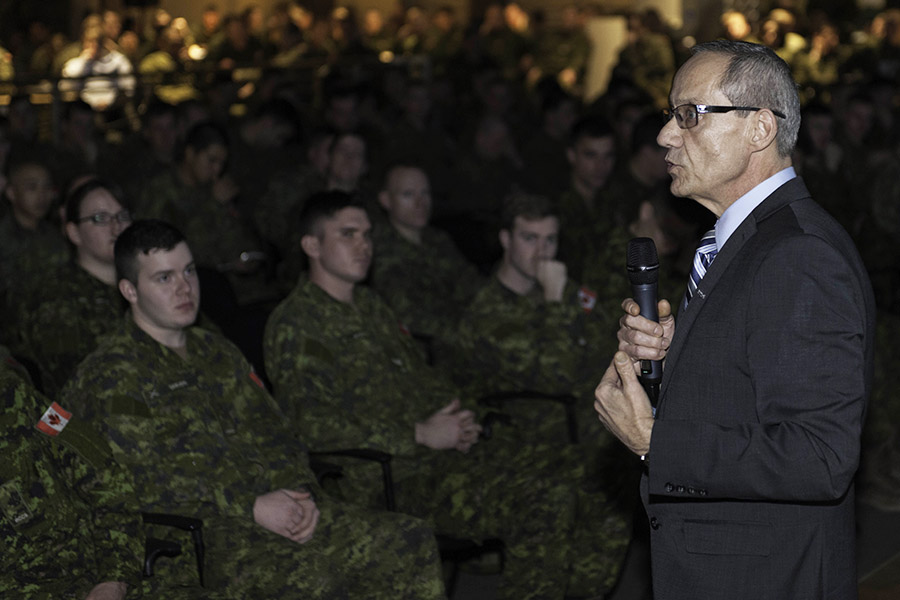
Gary Walbourne, National Defence and Canadian Armed Forces Ombudsman, speaks with members of the 3rd Canadian Division Support Base Edmonton during a town-hall in November 2016. [Canadian Forces]
In his March report, entitled The Case for a Permanent and Independent Ombudsman Office, Walbourne notes that the principles of the ombudsman have been developed, studied and tested since the 19th century.
Those principles seem obvious: independence, impartiality, fairness and confidentiality.
“Without these foundational principles, the ombudsman’s credibility and operational effectiveness are at risk,” Walbourne writes. “Independence from the organization subject to review must be entrenched in legislation.
“Otherwise, the ombudsman is at risk of repercussions following an unfavourable review or recommendation…. The ombudsman must be, and must be seen to be, free to conduct reviews, make recommendations and be unfettered in its decisions by the organization it oversees.”
The government rejected the request.
Defence Minister Harjit Sajjan pointed out in a letter to Walbourne that DND oversight of the ombudsman’s finances and human resources is the result of a scathing 2015 report by Auditor General Michael Ferguson.
Ferguson took the department to task for not keeping closer tabs on Walbourne’s predecessor, Pierre Daigle, who approved his own expenses and flaunted contracting rules.
Sajjan said that while he values the ombudsman’s mandate and operational independence, he feels the current arrangement works.
“In addition, this model mirrors almost all other similar offices across government and meets the test of proper stewardship of resources,” Sajjan wrote.
Indeed, in practice, the position of ombudsman generally seems in conflict of interest. It is traditionally created and paid for by the institution it is mandated to police and criticize, its only protections being the laws and regulations written to protect it.
As a rule, this works quite well in private industry, where the all-important bottom line depends on a satisfied and productive workforce, thus providing employers with incentive to support the work of their ombudsmen.
In the case at hand, however, something appears to be broken somewhere between the ombudsman’s office and Sajjan’s. This apparent disconnect is at the root of Walbourne’s complaints.
The military ombudsman’s office, created in 1998, has nearly 60 civilian staff and an annual budget of about $6 million. It receives about 13,000 calls each year and, according to the Toronto Star, is currently working on some 1,900 cases.
Walbourne came out shooting darts after receiving Sajjan’s letter. He accused officials of “insidious” attacks whenever his office releases a report critical of the department.
He told The Canadian Press those attacks have impaired his ability to hold DND to account. Walbourne even suggested Sajjan is part of the problem, citing the minister’s “nebulous” response to two of his recent reports as examples.

Walbourne, with Chief Warrant Officer Jean-Claude Parent (left) and Lieutenant-Colonel Gilles Couture, Wing Operations Officer, 19 Wing Comox. [Canadian Forces]
In a recent reply to Sajjan, the ombudsman noted that the minister has been made well aware of the concerns over his office’s independence.
“The issues surrounding the governance structure of this office are not new,” noted Walbourne. “They have been identified by every former Ombudsman office holder and were analyzed” by the auditor general.
He wrote that his office’s strategies to address issues raised by the auditor general’s report have been so effective that the department has recognized them as best practices. And he said his call for independence represents his best advice to ensure an effective, responsible and credible ombudsman’s office.
“After a comprehensive review, my conclusion is that the dysfunction that has preoccupied every holder of this office is inherent in the governance structure and is beyond the goodwill and efforts that have been expended to make it functional.
“Maintaining the existing governance framework in no way demonstrates respect of the mandate or the operational independence intended by the framers of the office.”
Advertisement



















